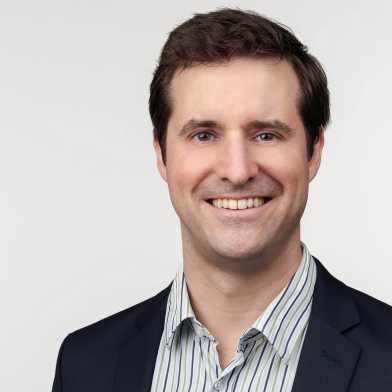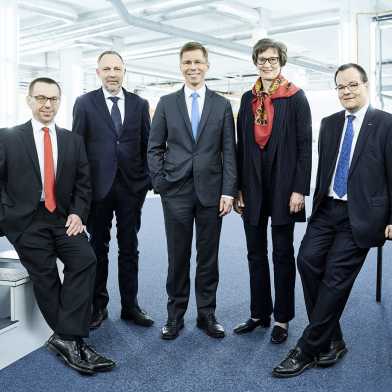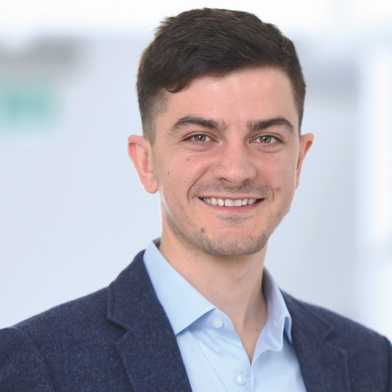06
Meet Sarah Brüningk working on the predictability of the onset of Alzheimer’s disease

The German Postdoctoral researcher has not yet met any of the team members of the Machine Learning and Computational Biology Lab in person – she joined the D-BSSE during the COVID-19 pandemic. But thanks to the vibrant and virtual way of working, Sarah quickly got a grasp on her research which aims to improve the prediction of the onset of Alzheimer’s disease by transferring information from imaging data of patients suffering from traumatic brain injuries.
New method for protein circuit engineering in synthetic biology

Understanding and controlling intracellular processes and hence, cell behavior is a key aspect in synthetic biology. Of particular interest is the regulation of signal processing by phosphorylation of effector proteins. However, tools for phosphoregulation in mammalian cells are limited. By repurposing components from bacterial systems, Leo Scheller from the group of Martin Fussenegger and colleagues now present a framework for the generation of new modules for the construction of signaling cascades.
New D-BSSE lab connects cellular location with function

The lab of Andreas Moor, our new Assistant Professor of Systems Physiology, is specialised on how cells communicate and collaborate with one another in complex tissues. The medical oncologist and systems biologist is interested in stromal, tumor and immune cells – and develops novel methods for single-cell analyses and tissue physiology. An interview with our new faculty member.
Quantifying the epidemic spread of COVID-19

What does the genetic sequencing data of SARS-CoV-2, the virus causing the COVID-19 disease, tell us? And why is the reproductive number a key quantity in an epidemic for health officials and other decision makers? Professor Tanja Stadler, head of the Computational Evolution Group at the D-BSSE and member of the Swiss COVID-19 Science Task Force, provides an insight into the research of her team on the epidemiology and evolution of COVID-19.
New high-performance NMR spectrometer - and other news from the ETH Executive Board

ETH Zurich and the universities of Basel and Zurich are getting a new shared technology platform named "Swiss National Ultrahigh-Field Solution NMR Facility" which includes a 0.8 gigahertz spectrometer to be based in Basel. This news and other updates from the ETH Executive Board are now online (Update 2020/3).
Randall Platt listed by MIT as one of the top technology innovators in the world under the age of 35

The annual list of most promising inventions this year includes Randall Platt and his lab’s work on transcriptional recording, a CRISPR-based technology which endows cells with a synthetic memory recording molecular events across time. In the words of MIT technology review: “a technology that has the potential to transform our understanding of a number of important biological processes”.
Novel screening method to fight tropical disease Schistosomiasis

Schistosomiasis (bilharzia or snail fever) is a tropical parasitic disease caused by the worm Schistosoma affecting some 200 million people worldwide annually. Its treatment with Praziquantel remained unchanged for the past 40 years although reports suggest a reduced efficacy of this drug. Researchers from the Bio Engineering Lab of Andreas Hierlemann and Jennifer Keiser's group at Swiss TPH developed a new impedance-based platform to efficiently screen for novel antischistosomal drug compounds.
D-BSSE spinoff identifies potent SARS-CoV-2 neutralising antibodies

In an interview with CNN Money Switzerland, the CEO of Memo Therapeutics Karsten Fischer announced the discovery and subsequent analysis of a repertoire of ultra-rare but highly neutralising antibodies isolated from the blood of COVID-19 recovered patients. The most potent candidates will be used for the development of therapeutic antibodies as well as rational vaccine strategies.
Translating machine learning techniques into a service for industrial applications

Machine learning techniques have widespread applications in industry. The ETH spinoff Visium, co-founded in 2018 by D-BSSE doctoral student Matteo Togninalli, supports clients throughout the entire cycle of a cutting-edge machine learning project, from ideation to integration and scaling. The technical know-how partly originates from the D-BSSE Machine Learning and Computational Biology Lab of Professor Karsten Borgwardt.
Digital Campus: Bio(graphy) Breakfast

On 22 June, 9AM, principal investigator Sven Panke and scientist-in-industry Andrea Spinnler will share their inspiring bios with us and respond to questions on career choices, lessons learned, pitfalls and opportunities you must grasp. For D-BSSE community members only!